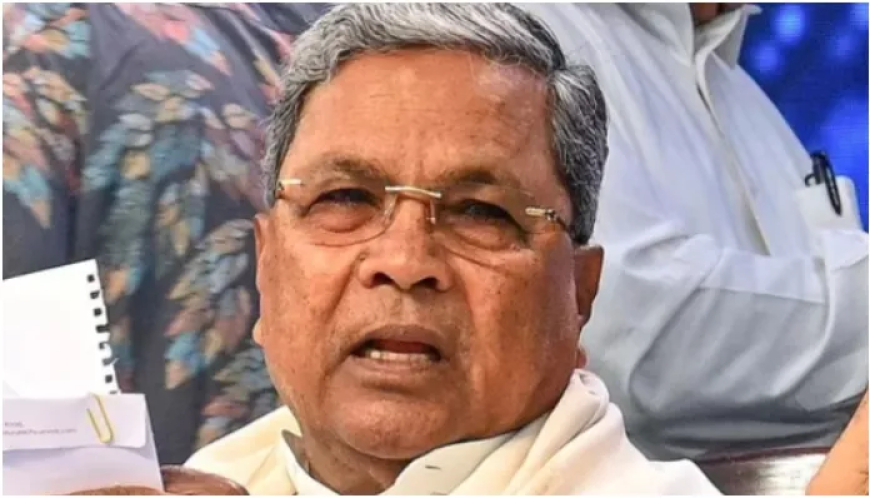Siddaramaiah Quashes Power-Sharing Rumours, Asserts Full-Term Leadership in Karnataka
Karnataka Chief Minister Siddaramaiah has firmly denied any 50-50 power-sharing deal with Deputy CM D.K. Shivakumar, confirming he will serve a full term. Here’s the full story.

Bengaluru, July 11, 2025 — Karnataka Chief Minister Siddaramaiah has firmly denied any ongoing or future arrangement for power-sharing with Deputy Chief Minister D.K. Shivakumar, putting to rest widespread speculation that the two top Congress leaders had agreed to a 50-50 governance model following the party’s sweeping win in the 2023 Assembly elections.
Addressing the media at Vidhana Soudha, Siddaramaiah clarified, “There is no agreement on power-sharing. I will serve as the Chief Minister for the full five-year term, as decided by the Congress high command.”
This decisive statement comes in the wake of weeks of political whisper campaigns and social media debates suggesting an internal arrangement wherein Siddaramaiah would serve for two and a half years, to be succeeded by Shivakumar for the remainder of the term. The Congress leadership has now moved swiftly to squash such theories, seeking to maintain unity within the state government and prevent distractions from its policy agenda.
Background of the Rumours
The speculation gained momentum due to perceived friction between the two powerful Congress leaders. Shivakumar, the state Congress president and a Vokkaliga strongman, played a critical role in the party’s return to power in Karnataka. His increasing public outreach, coupled with strategic visits to party workers and loyalists across the state, was interpreted by some as a sign of preparation for a leadership change.
Moreover, several senior Congress leaders, both within and outside the state, had remained ambiguous on the matter in previous media interactions, allowing the rumour mill to churn unchecked. However, the Chief Minister’s recent declaration appears intended to bring clarity and quell internal anxiety.
Siddaramaiah’s Full-Term Mission
Siddaramaiah, a veteran politician and one of the most experienced administrators in the Congress camp, remains a popular figure among various social groups, especially the AHINDA (minorities, backward classes, and Dalits) coalition. Since taking office in 2023, he has rolled out a series of welfare schemes, including the Gruha Lakshmi initiative and Anna Bhagya, aimed at delivering direct benefits to the economically weaker sections.
“The people of Karnataka voted for our guarantees. My focus is on delivering those promises. We are not here to indulge in political games,” Siddaramaiah said during the press conference.
Observers say this emphasis on stability is critical, especially as Karnataka remains one of the few large states where the Congress has a clear mandate and control. Any instability or infighting could hurt its national prospects ahead of the 2029 general elections.
What This Means for D.K. Shivakumar
Shivakumar, who has long nurtured Chief Ministerial ambitions, publicly supported Siddaramaiah's leadership on multiple occasions but has also made clear his aspirations are still alive. Following Siddaramaiah’s announcement, Shivakumar refrained from commenting directly on the statement but maintained that the Congress government’s focus is on development and governance.
Political analysts suggest that while Shivakumar may not be elevated to the Chief Minister’s chair during this term, he continues to hold significant influence over the party’s organizational matters in Karnataka. His control over the party machinery and grassroots mobilization remains unmatched, and he is expected to play a vital role in the 2028 assembly elections and beyond.
The Congress High Command’s Silent Strategy
The Congress central leadership, including Mallikarjun Kharge and Rahul Gandhi, has so far maintained a careful distance from the power-sharing debate, allowing the state unit to handle the matter internally. However, sources within the party suggest that the high command had already made a decision post-2023 elections to back Siddaramaiah for a full term, given his wide acceptability among various caste and regional groups.
It is also being interpreted as a move to avoid the instability that previously affected the Congress-JD(S) coalition in 2018, which collapsed due to leadership tussles and defections.
Opposition Reacts Cautiously
The BJP, which has been on the back foot in Karnataka since its 2023 defeat, seized the moment to criticize the Congress for internal confusion but stopped short of making direct attacks on Siddaramaiah. BJP leader and former CM Basavaraj Bommai said, “The Congress is busy sorting out its internal power games while the state suffers.”
However, analysts believe that Siddaramaiah’s strong message may close the chapter, at least for now, and allow the Congress to present a united front.
Looking Ahead: Governance Over Politics
With this clarification, Siddaramaiah’s government is expected to double down on flagship schemes and development projects, particularly in the infrastructure, agriculture, and employment sectors. Karnataka is expected to see a renewed push in areas such as Bengaluru’s Smart City revamp, green mobility, rural employment, and technology-driven governance reforms.
The CM also hinted at upcoming policy announcements in the Budget session slated for later this month, which will focus on rural revitalization, women’s welfare, and healthcare access.
Political stability, analysts say, is now the Congress’s biggest asset in Karnataka. With power-sharing talks officially dismissed, the ruling party can now concentrate on delivering tangible results that could shape its electoral fortunes across southern India.
Conclusion
Siddaramaiah’s clear and assertive message puts a lid on the swirling rumours of a power-sharing agreement in Karnataka. In a state where coalition collapses and shifting loyalties have often marred governance, a strong and singular leadership narrative might just be what the Congress needs to solidify its position and gain long-term political mileage.
Whether this translates into political dividends or fuels underlying tensions within the party ranks remains to be seen. For now, Karnataka seems set for five more years under the stewardship of Siddaramaiah.














